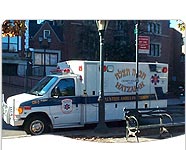 
New Treatment Guidelines for Asthma in Pregnant Women
By Jeff Minerd, MedPage Today Staff Writer
Reviewed by Robert Jasmer, MD; Assistant Professor of Medicine, University of California, San Francisco
January 21, 2005,
News Article: MSNBC
Review
The federal guidelines on managing asthma during pregnancy were updated to include newly available
medicines and a systematic review of safety data on asthma drugs in pregnant women. These are the first
new guidelines in more than a decade from the National Asthma Education and Prevention Program, a coalition
of health organizations overseen by the National Heart, Lung, and Blood Institute (NHLBI).
For pregnant women, the new safety data "suggest that it is safer to take medications than to have
asthma exacerbations," says Barbara Alving, acting director of NHLBI. "The guidelines should be a useful
tool for physicians to develop optimal asthma management plans for pregnant women."
Key recommendations from the guidelines include:
• Albuterol should be used as a quick-relief medication to treat asthma symptoms, and pregnant
women with asthma should have this medication available at all times.
• Pregnant women with persistent asthma need daily medication, preferably inhaled corticosteroids.
Alternative daily medications are leukotriene receptor antagonists, cromolyn, or theophylline.
• For severe asthma, oral corticosteroids may be needed. The safety of oral corticosteroids in pregnant
women is still unclear, but severe, uncontrolled asthma is associated with increased maternal and fetal mortality.
• Pregnant women with persistent asthma should have their asthma monitored monthly.
"Clinicians who provide obstetric care should be part of the patient's asthma management team, working
with the patient and her asthma care provider to adjust her medications if needed to keep her asthma under
control and to lower the risk of complications from asthma for her and her baby," commented Mitchell Dombrowski,
chief of obstetrics and gynecology for St. John Hospital in Detroit and guideline panel member.
The full guidelines and a quick reference guide are available in the NHLBI site at
http://www.nhlbi.nih.gov/health/prof/lung/asthma/astpreg.htm. The quick reference guide is also published
in the January 2005 issue of the Journal of Allergy and Clinical Immunology.
Primary source: National Heart, Lung, and Blood Institute.
Source reference: National Heart, Lung, and Blood Institute. National Asthma Education and Prevention Program Expert Panel Report:
Recommendations for Pharmacologic Treatment-2004 Update. Accessed January 18, 2005.
The above is for general informational purposes only. Always consult your
physician regarding specific medical issues and call Hatzalah or your local
ambulance service in the event of an emergency.
Back to Digest Index
|









